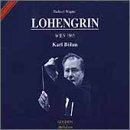| All Artists: Richard [Classical] Wagner, Karl Böhm, Chor und Orchester der Wiener Stattsoper, Vienna State Opera Chorus and Orchestra, Vienna State Opera Orchestra, Christa Ludwig, Claire Watson, Eberhard Wächter, Fritz Sperlbauer, Herbert Lackner, Jess Thomas, Kurt Equiluz, Ljubomir Pantscheff, Martti Talvela, Walter Berry Title: Wagner: Lohengrin Members Wishing: 0 Total Copies: 0 Label: Melodram Release Date: 12/19/2000 Genre: Classical Style: Opera & Classical Vocal Number of Discs: 3 SwapaCD Credits: 3 UPC: 608974110451 |
Search - Richard [Classical] Wagner, Karl Böhm, Chor und Orchester der Wiener Stattsoper :: Wagner: Lohengrin
 | Richard [Classical] Wagner, Karl Böhm, Chor und Orchester der Wiener Stattsoper Wagner: Lohengrin Genre: Classical
|
Larger Image |
CD Details |
CD ReviewsA Must Have for the Wagner Fan L. Lubin | NY, NY | 01/12/2009 (5 out of 5 stars) "There are many good recordings of Lohengrin on the market, and a few great ones. This performance from the Vienna State Opera in 1965 stands with the best. Some of the cast appear on other recordings, perhaps with better results, but this is a great, unified performance.
This is Karl Boehm's only available Lohengrin, and his usual no-nonsense, straight ahaead approach is evident, although not so rushed as the '67 Ring or as intense as the '66 tristan. Lohengrin is a different kind of opera: still deeply connected to Wagner's roots in Weber's romanticism. This is, whena all is said and done, the ultimate Romantic Opera. Boehm does allow the music to relax without losing momentum, as in the Bridal Chamber Scene and Elsa's Act II "Es gibt ein Gluck, das ohne Reu'." The difficult choruses are handled with absolute authority and assurance by what was then and remains the greatest opera chorus in the world, making it all the more regretable (even unthinkable to Wagner purists) that some of the second and third act choruses are cut. My first benchmark for a great Lohengin performance is the chorus preceding Lohengrin's entrance: furiously tricky writing that demands enormous concentration and attention to detail to maintain clarity and still build tension, and here we have it done exceptioanlly well. The same goes for the long antiphonal brass fanfares in Acts II & III. The Vienna brass section is second to none, with a tradition that goes back to Wagner himself. Jess Thomas's Lohengrin is a well know comodity, and he is somewhat freer-sounding on the classic Kempe studio recording, and the live '62 Sawallisch from Bayreuth. Here, in a larger house is seems compelled to push a little, but only a little, here and there. Claire Watson (best known as Solti's Gutrune), in her only available Elsa, scales back to produce a youthfull, girlish sound, but when the occasion demands, such as the Act I finale, she lets loose with a whopping sound that rides easily over the chorus. The basso titan Martti Talvela, still in the first half-decade of his international carrer, unleashes his enormous voice with a power that rips through the chorus on the lowest notes (this role has a two octave range) and rings out over the heaviest brass writing. This is also Talvela's only available essaying of Koenig Heinrich. Eberhard Waechter's solidly sung herald lacks the subtely of his earlier Bayreuth performance. Which brings us to the villain pair, Ortrud and Telramund, here enacted by the then-married pair of Christa Ludwig and Walter Berry. And here is the real reason no red-blooded Wagner freak should be without this set. Berry, best known for lighter Mozart roles, unleashes all the necessary power in one of the most daunting roles on the baritone repertoire, with more high F-sharps than anyone has bothered to count. His vocal characterization is fully the equal of his technical prowess, which makes this mustache-twirling bad guy into a fully dimensional character. And matching him at every turn, even surpassing the best that this great artist always delivers, Christa Ludwig...has she ever been less than great?...literally stops the show when she erupts like a volcano with "Entweihte Goetter," after creating three vividly different personas in the course of Act II scene 1. The audience breaks out in riotous applause (In Vienna!!! In the middle of Wagner!!!) for well more than a minute, until Dr. Boehm finally brings the orchestra back in. Her transitions from hen-pecking wife to wheedling victim to outraged pagan sorceress in the space of half an hour are chilling and mind boggling. Only Varnay and Vinay come close to this kind of excitement, but only close. This is a collector's treasure. I wouldn't recommend it as a first recording: the sound is only fair, though clear, and a bit to much toward the voices. But for the real aficionado of vintage Wagner, or opera in general, this is a must. " |

 Track Listings (12) - Disc #1
Track Listings (12) - Disc #1